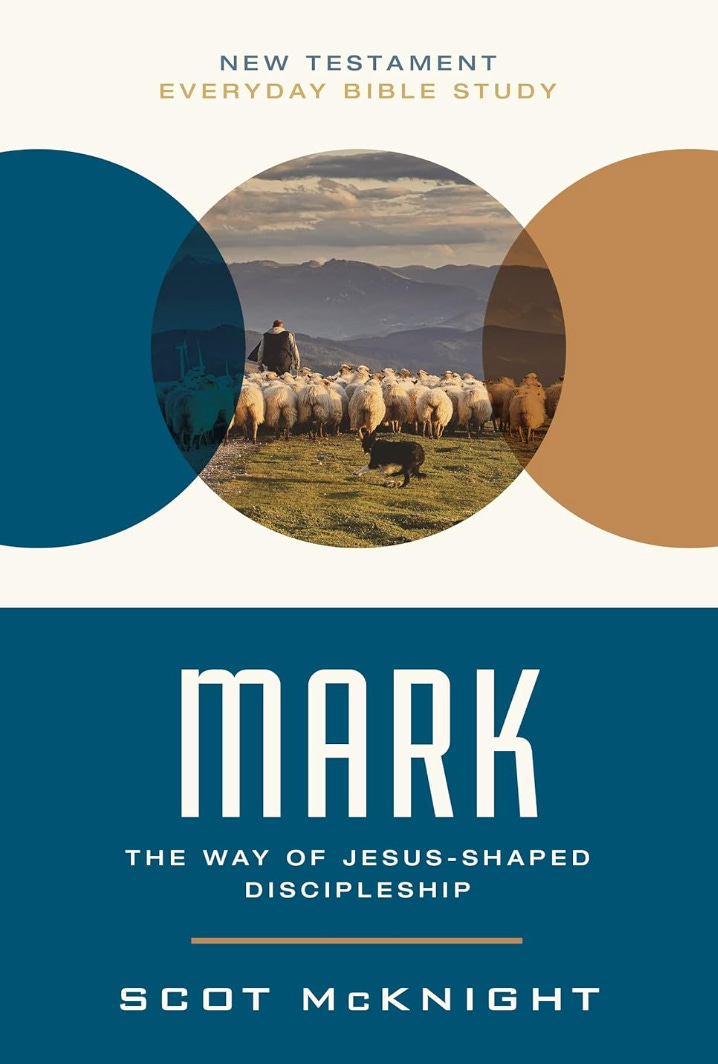Kingdom Power for All
From my Everyday Bible Study on The Gospel of Mark, with questions by Becky Castle Miller.
Mark 7:24-37
7:24 Jesus left that place and went to the vicinity of Tyre. He entered a house and did not want anyone to know it; yet he could not keep his presence secret. 25 In fact, as soon as she heard about him, a woman whose little daughter was possessed by an impure spirit came and fell at his feet. 26 The woman was a Greek, born in Syrian Phoenicia. She begged Jesus to drive the demon out of her daughter.
27 “First let the children eat all they want,” he told her, “for it is not right to take the children’s bread and toss it to the dogs.”
28 “Lord,” she replied, “even the dogs under the table eat the children’s crumbs.”
29 Then he told her, “For such a reply, you may go; the demon has left your daughter.”
30 She went home and found her child lying on the bed, and the demon gone.
31 Then Jesus left the vicinity of Tyre and went through Sidon, down to the Sea of Galilee and into the region of the Decapolis. 32 There some people brought to him a man who was deaf and could hardly talk, and they begged Jesus to place his hand on him.
33 After he took him aside, away from the crowd, Jesus put his fingers into the man’s ears. Then he spit and touched the man’s tongue. 34 He looked up to heaven and with a deep sigh said to him, “Ephphatha!” (which means “Be opened!”). 35 At this, the man’s ears were opened, his tongue was loosened and he began to speak plainly.
36 Jesus commanded them not to tell anyone. But the more he did so, the more they kept talking about it. 37 People were overwhelmed with amazement. “He has done everything well,” they said. “He even makes the deaf hear and the mute speak.”
Sometimes it’s best to walk away. The person who walks away, however, takes her gifts, her skills, and her personality with her. Which means, if the person is one with ministry gifts, she will walk right into other people to whom she can minister. When Beth Moore, whose new autobiography is running up the bestseller charts, left her Baptist church and went to another church, that church quickly surrounded her with those who look to experience her undeniable gifts of teaching and speaking (Moore, All My Knotted-Up Life). Just like Jesus. The two episodes in today’s passage reveal that (1) Jesus has to walk away (literally) from his kingdom work in the Galilee and (2) that Jesus uses kingdom power for persons in need outside Galilee. As Emerson Powery observes, it’s a small step from all foods are clean (7:19) to all persons can be cleansed (7:24-37; Powery, “Mark,” 135). In fact, Jesus anticipates the gentile mission that heats up to full steam under the apostle Paul.
Just Walk Away
Here are the clues. The first line in our passage begins with “Jesus left that place,” which means not all that much until we read “and went to the vicinity of Tyre” (7:24). The word “region” encompasses a larger area than the port city “Tyre,” so we need merely to assume Jesus left the northwest area of Galilee into Phoenicia. Matthew’s exact parallel to Mark’s verse says Jesus went to the “region of Tyre and Sidon,” with the latter city even further north on the coast of the Mediterranean. Mark 7:26 says she was a “Greek, born in Syrian Phoenicia.” It’s about forty miles from Capernaum to Tyre, with Sidon another ten miles. We’re reading about a minimum of two, but probably three to four, day’s journey. Definitely out of sight for the temple agents sent from Jerusalem.
Jesus “left the vicinity of Tyre” and, going the opposite direction of where he ends up in Mark’s next passage, that is he went north “through Sidon” and then wended his way back to the Galilee but, instead of returning to his previous site of ministry, he skirts by and ends up in “the region of the Decapolis” (7:31). Either Mark did not know the geography or, more likely, he knew Jesus was in no particular hurry to get to the Decapolis.
Jesus needed time to let the heat dissipate and the temple agents to return to Jerusalem. Even more, his strategy to persuade the crowds to embrace him and his kingdom vision needed time away for prayer, for rest, and for teaching his kingdom agents, the apostles. Time away, however, did not do anything but put more needy people on his path. Jesus simply cannot get away from himself.
Your Gifts Go with You
Near Tyre he enters into a house. He’s in a house in a stereotypical enemy territory. Josephus describes how both the Egyptians and the Phoenicians have never had a liking for the Jews. But of the Phoenicians the Tyrians are filled with the most rancor: “while of the Phoenicians it is known the Tyrians have been most of all in the same ill disposition towards us” (Against Apion 1.70).
True to the strategy for his popularity, he “did not want anyone to know it” but, healer that he was, “he could not keep his presence secret” (7:24). A woman – a woman, a gentile, a Phoenician, and a Tyrian – with a daughter who herself had a contaminating spirit (unclean, which means unfit for the temple) bows down to Jesus pleading for her daughter. Jesus’ response, by most accounts, is blunt and uses a stereotype. Very common, and today it would be very insensitive.
As Bonnie Bowman Thurston observes: “… as we see a sharp-witted Gentile woman, one who is altruistic, persistent and inventive, who does not hesitate to approach Jesus, and a Jesus who learns from a woman, who transcends the racist and sexist boundaries of his culture, who recognizes insights from outside the pale and acknowledges that faith can be found there too.” ( Thurston, “Mark,” 555).
She’s a gentile, and Jesus’ normal audience is Jewish. Jesus then uses a typical slur for gentiles (“dogs”) and says the “children” (Israel) need the food. His words do not put off this mom, so she turns a corner with his script with some “sass” to observe that children often (ours sure did) feed the dogs under the table (7:27-28; I take “sass” from Powery, 136). Mark sets up his audience in using this slur so that they can envision the breadth of Jesus’ compassion and kingdom redemption. And, clearly, Jesus sets her up for a clever response. Maybe he said “dogs” with a wink and a nod. And maybe he learned something from this gentile woman! Jesus loves her response. “For such a reply, you may go; the demon has left your daughter” (7:29), and she experienced the reality of the redemption when she got home to find her daughter well.
Now down in the Decapolis “some people” bring to Jesus a disabled man who was “deaf and could hardly talk” (that is, aphasic). Jesus puts his redemptive fingers on the man’s ears and on the man’s tongue, utters in Aramaic that they be opened, and “At this, the man’s ears were opened” and “his tongue was loosened” (7:33-35). With eyes and speech, he is restored to community as the disabled man becomes abled. True to form, and in his strategy to let his popularity die down, he “commanded them not to tell anyone,” but “they kept talking” (7:36). His popularity, instead of dying down, expands into gentile territories.
One of our graduates from Northern Seminary is pastor Derwin Gray, of Transformation Church on the border of North and South Carolina. He was a former NFL football player who was also a compulsive stutterer. But when he was redeemed by Jesus and turned his life over to him, Jesus touched his tongue and his stuttering began to disappear, and today he is a preacher of the gospel. Jesus is stilling touching tongues, with a hat tip to Lauren Daigle.
Jesus tried to dismiss the crowds, to get away, and to calm down his popularity but wherever he went his kingdom powers went with him. Again, Jesus can’t get away from himself. Thank God.
Questions for Reflection and Application
1. How does this section begin to foreshadow the later gentile mission?
2. What do you think of Jesus’ interaction with this mother? Why does he use the language he chooses?
3. Mark notes sometimes that Jesus spoke Aramaic during some of his miracles. What do you think of that?
4. Have you ever had to walk away from a ministry to better follow God? What was that like?
5. How might God be calling you to minister to people outside of traditional ministry or church?
Beth Moore, All My Knotted-Up Life: A Memoir (Carol Stream: Tyndale Momentum, 2023).




I read this ... and then again with my husband. We went over the questions at the end. We settled on number two especially. I find myself smiling as I see her interact with Jesus. Jesus never stopped having insight to people. We see by her response a bit about her, and I imagine a woman who could handle the reference to the "dogs". She had likely heard it before, but in a demeaning way. Something in her perhaps caught that Jesus was not demeaning. We know He was not cruel. He came to redeem all people, going to the Jew first. It seems to me that in using the Aramaic language He was speaking the common language to reach the common person. Maybe this, too, steps into the aspect of this "foreshadow of a Gentile mission". Those of us who follow Jesus today can learn a lot from this about living out and sharing the gospel. How many in our world have been mistreated and demeaned in the name of "evangelicals" or religion? Thanks once again for a stimulating and inspirational read.
Thank you for a great insight. It always amazes me how Jesus never let race , nationality matter. I don’t get the “tip” to Lauren Daigle?